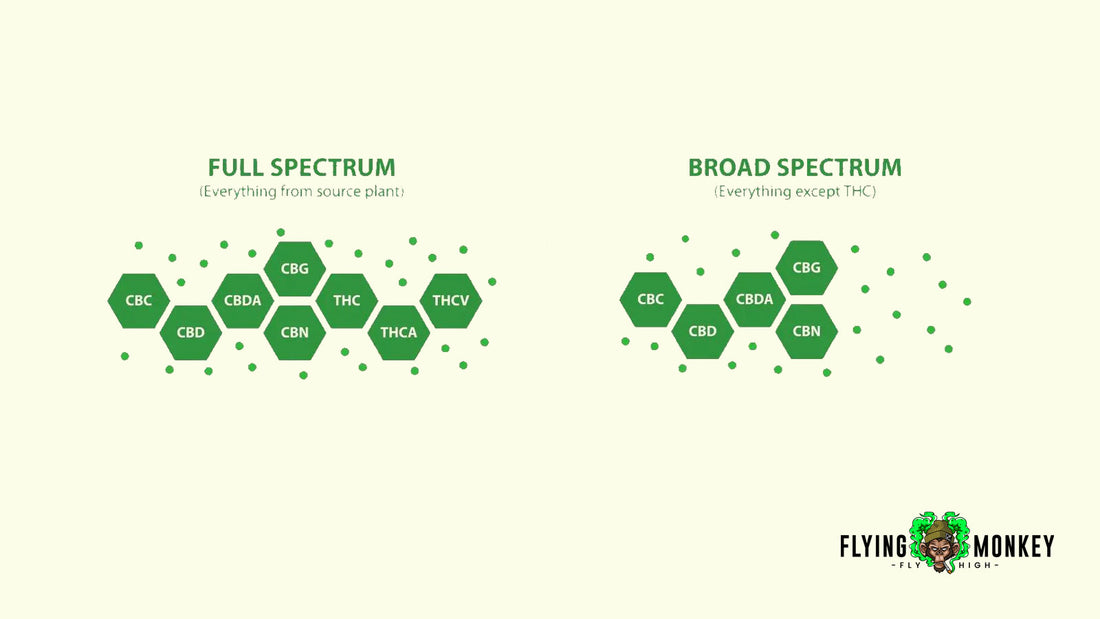Full Spectrum CBD vs. Broad Spectrum CBD
One of the many substances found in the cannabis plant is CBD. It is the plant's most prevalent component besides THC. Full spectrum CBD, broad-spectrum CBD, and CBD isolate are the three main varieties of CBD.
Understanding these labels is vital when identifying the cannabinoid ingredients inside your choice of CBD oil. Each type has unique effects, depending on your preferences.
Fundamental Difference
The major difference between a full spectrum and a broad spectrum CBD is the chemical compounds that they are comprised of. Full-spectrum CBD refers to a CBD product that contains many naturally occurring cannabis plant extracts, such as terpenes and other cannabinoids – including up to 0.3% THC. While THC is a non-existent broad-spectrum CBD, it contains several other cannabis plant components. Nevertheless, broad-spectrum CBD products may occasionally contain minute quantities of THC.
CBD, on the other hand, is the purest form of CBD. There are no other cannabis plant components present in it. It originates from hemp plants, which normally have relatively little THC concentrations. The crystal form of CBD known as CBD isolate is frequently ground up and offered for sale as a powder. Crystals of CBD are another name for them. The only factor that separates the full spectrum from the broad spectrum is the presence of THC.
Effects
Full-spectrum CBD has relatively moderate head effects while broad-spectrum CBD has none. But both will support the calming and unwinding effects that CBD is frequently linked to.
Full spectrum CBD, in contrast to Broad spectrum CBD, contains smaller amounts of THC and that is the reason why many people experience a pleasant euphoria and sense of relaxation. Other common side effects, which can differ significantly from person to person, including increased appetite, heightened sensory awareness (such as seeing brighter colors), laughter, and altered perception of time.
Usage
The full-spectrum CBD contains some THC, so you should anticipate getting high to some level. When feeling tense and anxious, it is frequently utilized by people to relax their nerves and direct their attention to positive emotions.
People who want to maintain full mental cognition, as well as experience calming sensations and take a break from the emotions that frequently cause more harm than good, utilize broad spectrum CBD. As a result, many CBD consumers prefer broad-spectrum products when using them before a test or a job interview. It is usually taken during the daytime.
Flavor and odor
CBD isolate is reported to have no taste, no color, and no odor. Due to the terpenes and other chemical elements present, both, broad-spectrum and full-spectrum CBDs typically have a flavor that is similar to hemp.
Advantages
Broad spectrum
- Blocks Pain and soothes
- Anti-inflammatory properties
- Aids Nausea and anxiety
- Zero THC means it is safe to use during the daytime
Full Spectrum
- Gets you high with less harm
- More overall benefits than CBD isolates
- Allows the benefits of the entourage effect
Disadvantages
Broad Spectrum
- Small residues of THC may be present simply because they were not fully removed during the extraction procedure, which the user may be unaware of.
- Some workplaces will not allow the use of hemp-derived products, including CBD even without THC.
Full Spectrum
- Some states have stricter regulations for it.
- THC in the system may be prohibited by employers or organizations
- due to its stronger natural flavor that some people dislike.
Which one to choose?
It is entirely up to you which type of CBD you choose, however, if you want to limit the consumption of THC, go with a CBD isolation product. Choose a full-spectrum product if you want extra cannabis components. If you fall anywhere in the middle, you might want to opt for broad-spectrum products.
Deciding any one of them is based on what works best for you. Because of the integration between CBD and other cannabis plant chemicals, full-spectrum products may generate more prominent effects. However, this does not imply that CBD isolate or broad-spectrum CBD products are wholly ineffective. They can be an excellent option for folks who are sensitive to THC or who need to take substantial amounts of CBD for concerns such as chronic pain.
Key Takeaways
While looking for CBD can be difficult, knowing a few essential factors will make the process lot easier. CBD concentrates are available in a variety of forms and typically include 45% to 99.9% cannabidiol.
CBD products are classified into three types:
- CBD Isolate is fundamentally a powder or crystal version of CBD that includes CBD only.
- Full Spectrum CBD Oil is comprised of all of the cannabinoids and other compounds found in the plant originally i.e. prior to extraction.
- Broad Spectrum CBD oil contains everything that full spectrum CBD oil does except THC.
Before you decide which one to choose, it is better to do thorough research on the existing components of each. Even better, if you consult a specialist and see what and how much works best for you.
One of the many substances found in the cannabis plant is CBD. It is the plant's most prevalent component besides THC. Full-spectrum CBD, broad-spectrum CBD, and CBD isolate are the three main varieties of CBD.
Understanding these labels is vital when identifying the cannabinoid ingredients inside your choice of CBD oil. Each type has unique effects, depending on your preferences.
Fundamental Difference
The major difference between a full spectrum and a broad spectrum CBD is the chemical compounds that they are comprised of. Full-spectrum CBD refers to a CBD product that contains many naturally occurring cannabis plant extracts, such as terpenes and other cannabinoids – including up to 0.3% THC. While THC is a non-existent broad-spectrum CBD, it contains several other cannabis plant components. Nevertheless, broad-spectrum CBD products may occasionally contain minute quantities of THC.
CBD, on the other hand, is the purest form of CBD. There are no other cannabis plant components present in it. It originates from hemp plants, which normally have relatively little THC concentrations. The crystal form of CBD known as CBD isolate is frequently ground up and offered for sale as a powder. Crystals of CBD are another name for them. The only factor that separates the full spectrum from the broad spectrum is the presence of THC.
Effects
Full-spectrum CBD has relatively moderate head effects while broad-spectrum CBD has none. But both will support the calming and unwinding effects that CBD is frequently linked to.
Full spectrum CBD, in contrast to Broad spectrum CBD, contains smaller amounts of THC and that is the reason why many people experience a pleasant euphoria and sense of relaxation. Other common side effects, which can differ significantly from person to person, including increased appetite, heightened sensory awareness (such as seeing brighter colors), laughter, and altered perception of time.
Usage
The full-spectrum CBD contains some THC, so you should anticipate getting high to some level. When feeling tense and anxious, it is frequently utilized by people to relax their nerves and direct their attention to positive emotions.
People who want to maintain full mental cognition, as well as experience calming sensations and take a break from the emotions that frequently cause more harm than good, utilize broad spectrum CBD. As a result, many CBD consumers prefer broad spectrum products when using them before a test or a job interview. It is usually taken during the daytime.
Flavor and odor
CBD isolate is reported to have no taste, no color, and no odor. Due to the terpenes and other chemical elements present, both, broad-spectrum and full-spectrum CBDs typically have a flavor that is similar to hemp.
Advantages
Broad spectrum
- Blocks Pain and soothes
- Anti-inflammatory properties
- Aids Nausea and anxiety
- Zero THC means it is safe to use during the daytime
Full Spectrum
- Gets you high with less harm
- More overall benefits than CBD isolates
- Allows the benefits of the entourage effect
Disadvantages
Broad Spectrum
- Small residues of THC may be present simply because they were not fully removed during the extraction procedure, which the user may be unaware of.
- Some workplaces will not allow the use of hemp-derived products, including CBD even without THC.
Full Spectrum
- Some states have stricter regulations for it.
- THC in the system may be prohibited by employers or organizations
- due to its stronger natural flavor that some people dislike.
Which one to choose?
It is entirely up to you which type of CBD you choose, however, if you want to limit the consumption of THC, go with a CBD isolation product. Choose a full-spectrum product if you want extra cannabis components. If you fall anywhere in the middle, you might want to opt for broad-spectrum products.
Deciding on any one of them is based on what works best for you. Because of the integration between CBD and other cannabis plant chemicals, full-spectrum products may generate more prominent effects. However, this does not imply that CBD isolate or broad-spectrum CBD products are wholly ineffective. They can be an excellent option for folks who are sensitive to THC or who need to take substantial amounts of CBD for concerns such as chronic pain.
Key Takeaways
While looking for CBD can be difficult, knowing a few essential factors will make the process lot easier. CBD concentrates are available in a variety of forms and typically include 45% to 99.9% cannabidiol.
CBD products are classified into three types:
- CBD Isolate is fundamentally a powder or crystal version of CBD that includes CBD only
- Full Spectrum CBD Oil is comprised of all of the cannabinoids and other compounds found in the plant originally i.e. prior to extraction
- Broad Spectrum CBD oil contains everything that full spectrum CBD oil does except THC
Before you decide which one to choose, it is better to do thorough research on the existing components of each. Even better, if you consult a specialist and see what and how much works best for you.

